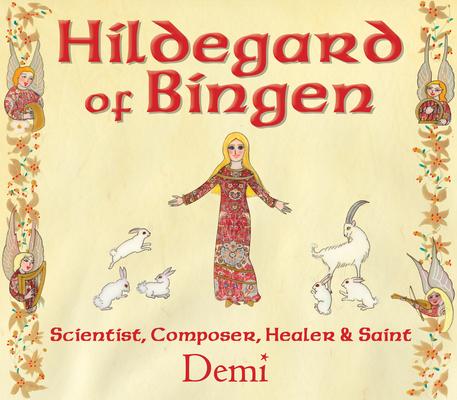Hildegard of Bingen (1098-1179) was one of the most remarkable and influential women of her time. Blessed with an astonishing array of talents, she was at once a mystic, theologian, scientist, doctor, nutritionist, composer, writer, linguist, and artist. Born to a noble family in Mainz, Germany, Hildegard entered a Benedictine monastery and went on to become abbess of a thriving community near Bingen. From a young age she received extraordinary "lights" or visions of Heaven, which she described in a book called Know the Ways (of God). Hildegard's collection of imaginative music and poetry includes seventy-seven songs for the liturgical year and a morality play, making her the most prolific composer of early music in Europe. Her pioneering scientific work formed the basis for the study of natural history in Germany, while her holistic medical studies helped to provide cures for numerous diseases. Hildegard was also the author of a cookbook recommending nutritional "foods of joy" and she even invented a new language! Such was Hildegard's fame and influence that bishops, popes, and kings, as well as humble peasants, sought out her wise counsel. Today, Hildegard of Bingen is recognized as a saint and doctor by the Catholic Church and is also revered by many Lutherans and other Protestants. Find out more about her life in this beautifully illustrated book by award-winning author, Demi.

Hildegard of Bingen: Scientist, Composer, Healer, and Saint
Hildegard of Bingen (1098-1179) was one of the most remarkable and influential women of her time. Blessed with an astonishing array of talents, she was at once a mystic, theologian, scientist, doctor, nutritionist, composer, writer, linguist, and artist. Born to a noble family in Mainz, Germany, Hildegard entered a Benedictine monastery and went on to become abbess of a thriving community near Bingen. From a young age she received extraordinary "lights" or visions of Heaven, which she described in a book called Know the Ways (of God). Hildegard's collection of imaginative music and poetry includes seventy-seven songs for the liturgical year and a morality play, making her the most prolific composer of early music in Europe. Her pioneering scientific work formed the basis for the study of natural history in Germany, while her holistic medical studies helped to provide cures for numerous diseases. Hildegard was also the author of a cookbook recommending nutritional "foods of joy" and she even invented a new language! Such was Hildegard's fame and influence that bishops, popes, and kings, as well as humble peasants, sought out her wise counsel. Today, Hildegard of Bingen is recognized as a saint and doctor by the Catholic Church and is also revered by many Lutherans and other Protestants. Find out more about her life in this beautifully illustrated book by award-winning author, Demi.